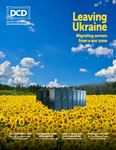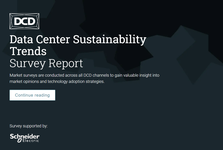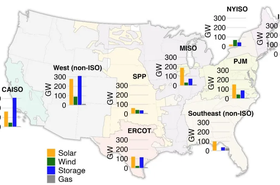The data center sector is now "productizing sustainability," Michael Winterson told DCD Connect London this week - and the message was echoed by pretty much every other delegate at the event.
But what did he mean? The sustainable data center service isn't an optional extra, the Equinix managing director explained: "It's not a premium product. It is THE product." Customers now want accurate information about the environmental footprint of assets and services, Winterson said, and the sustainable data center product is there to give them what they need.
There are two issues with that. Can we prove the benefits? And how much does society want them?
Where are the metrics for sustainable data centers?
Firstly, it is not at all clear how environmental footprints will be measured and compared. The industry has an energy efficiency metric called PUE, which is rather long in the tooth, and has severe limitations. It does not address the carbon intensity of the energy used in a facility, and it ignores inefficiencies within the rack. Also, it delivers a ratio, not an absolute value, so it is no use at all in any form of accounting.
Other measures like water usage efficiency (WUE) and carbon usage efficiency (CUE) have been introduced, but they suffer from similar issues and complicate matters. They are lagging behind the real world, where organizations are expected to be able to analyze their footprint according to the GHG Protocols, analyzing emissions under the Scope 1, Scope 2, and Scope 3 headings.
It's clear from a number of recent reports, that cloud users could move workloads geographically to reduce their overall footprint. A recent report found that Sweden and France have cleaner power than other EU nations, while Iceland and Norway also have a strong claim - so they could draw in workloads.
This week, the Uptime Institute has launched a tool to balance the potential carbon savings of moving loads to another company, against the latency cost of doing so. There are hints that Iceland or other low-carbon countries, could make this a selling point for their data center sectors.
The trouble is, measuring the total footprint of anything is potentially very complex - and despite the arrival of these tools, the results are very hard to compare.
For instance, Microsoft's Scope 3 emissions are higher than some cloud competitors, because of the emissions associated with its hardware retail line. Amazon has a worse problem because it is a giant retailer.
If you are buying a cloud service, should you consider the entire footprint of the provider? How much of your ecosystem do you have to include? Sooner or later, you will have to report on Scope 3, due to a likely amendment of the US SEC reporting rules, and similar regulations in Europe. There are ways to begin reporting though - and actual benefits from doing so, according to one panel at the DCD London event, Is Scope 3 of the GHG Protocol too complex for the industry to report on?
The London event also saw the launch of a group effort to improve carbon reporting. The iMasons Climate Accord aims to reduce embodied carbon in digital infrastructure, and will be led by Sunni Wissmer, of sustainability consulting firm Brightworks, and aims to produce objective ways to report comparable data on environmental impacts.
Going down the Tobacco Road
The other issue is that data centers still have a superior, isolationist view of themselves, they communicate poorly with the rest of the world, and this can lead to confrontation.
Speakers at the DCD event claimed that "businesses predict the future better than governments," and complained that naive public servants didn't even understand the basics of Net Zero. Hardly the best way to win friends and influence people.
The data center sector seems to think it can work alone and, by achieving Net Zero, solve all the world's problems - and it needs to take a more realistic view.
Data centers have the funds to achieve Net Zero within their patch - but that will not be enough. Even a Net Zero data center will consume a certain amount of renewable energy - which might be better used elsewhere. If other sectors, like heating and transport, need more renewable energy, then maybe society will have to get by with fewer data centers than our providers want to deliver.
Data centers can rightly claim that they do produce benefits elsewhere. But the so-called "ICT Handprint" is hard to measure. The benefits from digitization are normally a simple assertion, so the case for massive data center expansion simply amounts to special pleading by one sector.
Data centers are finally accepting the idea of being regulated. Under the EU Corporate Sustainability Directive, they will have to report their environmental impacts, and comply with the EU Code of Conduct, a framework for sustainable data centers.
Leigh Lloyd, global director of sustainability at Yondr, thinks the sector could learn from the mistakes of the oil industry. It's well documented that oil firms knew the science, yet they tried to deny it and lobby against it: "But in their boardrooms, I think they did know what was coming."
She thinks the sector needs to be upfront, address the data, and work with governments. Winterson also sees the sense in complying with regulations rather than fighting them.
"Think about tobacco versus alcohol. Most of us immediately see tobacco equals death, alcohol equals fun. The reality is both of them are perfectly legal drug delivery mechanisms. One industry denied, denied, and denied. The other supports Drink Aware and campaigns to reduce alcohol abuse. Which industry is suffering under horrible regulations, and which industry is regulated, but is doing well with regulations?"
He warns: "This is where we are going today, our failure to communicate is going to take us straight down the Tobacco Road. We will be the pariah of the technology industry, even though we don't deserve it. We are the foundation of the industry, but regulators and elected officials will respond to the negative press, and it will not be pleasant."
Data centers will have to accept their place in the world, even if they achieve Net Zero.





